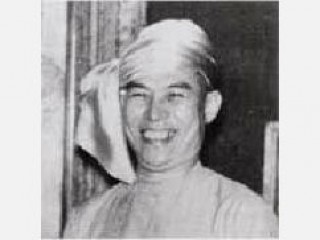
Ba Maw biography
Date of birth : 1893-02-08
Date of death : 1977-05-28
Birthplace : Maubin, Burma
Nationality : Burmese
Category : Politics
Last modified : 2011-01-03
Credited as : Politician, Premier of the British Crown Colony of Burma,
Ba Maw was the first premier of independent Burma (now Myanmar) and the leader of the wartime government that ruled in cooperation with the occupying Japanese from 1942 to 1945.
Ba Maw was born in Maubin on February 8, 1893. His father was U Kye, who had been an official of the courts of former Burmese kings Mindon and Thibaw and who had actively opposed the establishment of British colonial rule. By far the most learned of the first generation of active nationalist agitators against the British imperial presence, Ba Maw was educated at Rangoon College and at Calcutta University in India. Like many other Burmese nationalists, Ba Maw turned first to teaching as a profession, becoming the first Burmese to be appointed to the faculty of British-run Rangoon College in 1917. He later studied at Cambridge University in England, qualified as a barrister-at-law at Gray's Inn, London, in 1924, and received a doctorate in philosophy from Bordeaux University in France. Upon his return to Burma in 1924, he entered the practice of law.
Opposed to the detachment of Burma from British India because it might delay Burmese independence from Britain, Ba Maw was a leader of the faction of the divided General Council of Burmese Associations (GCBA, the country's first avowedly nationalist political organization) that became the Anti-Separation League. This wing of the GCBA won a majority in the 1932 elections. Two years later, Ba Maw became minister of education and public health in the government.
Ba Maw's advance in political prominence was partly the result of his defense of the nationalist Saya San, whose minor rebellion from 1930 to 1932 captured the popular imagination, though it did not inspire widespread participation. Ba Maw—highly Europeanized, Christian (in a Buddhist country), and partly Mon (a minority among the racially proud Burman majority)—courageously, if opportunistically, defended Saya San against a charge of seditious treason. Saya San was convicted and, after various appeals by Ba Maw, executed in 1937.
Ba Maw exploited the Saya San revolt and trial to augment his image as a nationalist and patriot. His defense of the rebel, whose unarmed followers had used "magic" and amulets to protect themselves against British bullets, was probably the main factor in his rise to the premiership.
In 1936, building on the popularity derived from his defense of Saya San, Ba Maw founded the Sinyetha Wunthanu (Poor Man's) party, the first Burmese political organization to appeal directly to the economic interests of the masses. Only 16 Sinyetha candidates were elected to the 132-seat legislature, but in 1937 Ba Maw nonetheless managed to emerge as the first Burmese premier after independence from India. He seemed to suffer a steady decline in popularity during his two-year premiership, which was far less radical in practice than it had been in electoral promises.
Allying himself with such younger and more radical Thakin (Our Masters) nationalists as Aung San and U Nu, Ba Maw was the chief founder in 1939 of the Freedom Bloc, which sought to establish contacts with the expanding Japanese to assist in ousting the colonial British from Burma. Jailed by the British in August 1940, he escaped from Mogok jail in April 1942, when the Japanese advanced into the country.
The same year Ba Maw was appointed head of the Provisional Administrative Committee by the Japanese, and in 1943 he assumed leadership of the Independence Preparatory Commission. When "independence" was granted by Japan on August 1, 1943, Ba Maw was named adipati (pseudo-royalist head of state) as well as premier.
Publicly Ba Maw seemed to revel in his new high status despite the restrictions inherent in the Japanese presence. Vanity had been one of his hallmarks, and he clearly enjoyed the privileges of his role as a pseudo-monarch. However, he was too wise and patriotic to be taken in by the Japanese or to feel no compassion for the material and psychological hardships of his countrymen, who had swapped a benevolent colonial ruler for a comparatively harsh one. Accordingly, he played a major role in mitigating the effects of the Japanese presence on his countrymen from 1942 to 1945.
Jailed by the Allies in Sugamo Prison, Japan, after the war, Ba Maw returned to Burma in 1946 but never again played a major political role. As a highly articulate critic, however, he persisted in challenging his country's younger rulers. He was jailed by military dictator Gen. Ne Win in 1966 for contact with proclaimed rebels against the regime. Following his release with other political detainees in 1968, Ba Maw returned to the private practice of law. He died on May 28, 1977.
Ba Maw's own perceptive account of the important years 1939-1946 can be read in his Breakthrough in Burma: Memoirs of a Revolution (1968). The same period is also treated by U Nu in Burma under the Japanese: Pictures and Portraits (1945; trans. 1954). A broader perspective is provided in, John F. Cady, A History of Modern Burma (1958). Also recommended is Frank N. Trager, Burma: From Kingdom to Republic: A Historical and Political Analysis (1966). A brief obituary appears in the New York Times (May 31, 1977).
















